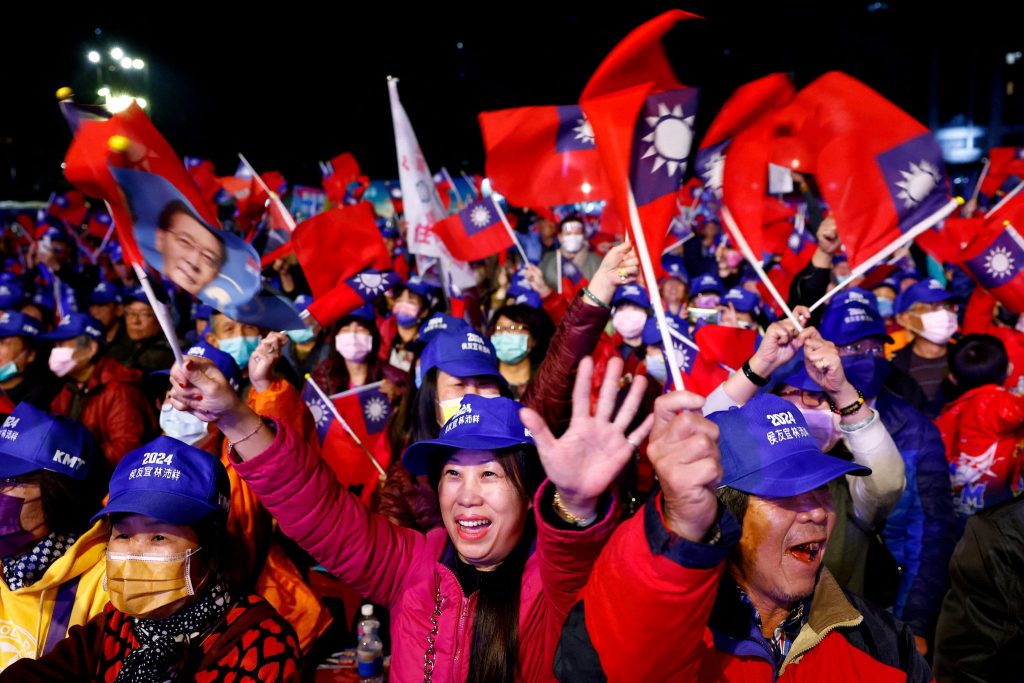Taiwan’s three-way presidential and legislative election campaign has entered a vital phase leading up to final rallies on 12 January and the vote on 13 January. With Taiwan at the heart of strategic tensions in Asia, the whole world is watching how Taiwanese voters react. Yet the dominant features of the campaign so far are the stability and resilience of Taiwan’s democratic and political processes, policy convergence on core strategic questions across parties and the focus of the campaign on socio-economic issues, not the contest in the Asian geopolitics.
Cross-strait relations do affect almost every dimension of policy in Taiwan, but they are not the key issue at the top of Taiwanese voters’ minds in 2024.
The state of the presidential race is now clear — no further polling is allowed before the final vote. Lai Ching-te (of the Democratic Progressive Party, DPP, or green camp), vice president under current President Tsai Ing-wen, leads the polls with support between 30.9 and 40 per cent across the latest range of polls (with a median support rate of 35.5 per cent). Lai’s main challenger, Hou Yu-ih (of the Kuomintang, KMT, or blue camp) has between 24.1 and 38 per cent (with median support at 31 per cent), about 5 points behind Lai. The third candidate, Ko Wen-je (of the Taiwan People’s Party, TPP, or white camp), a colourful no non-sense former Taipei city mayor, has between 18.9 and 25.2 per cent (or a median of 22 per cent) support.
One week before the vote, undecided voters represent around 15 per cent of the electorate and where they go will be decisive. In particular, young urban voters prefer the frank speech and creative solutions presented by Ko Wen-je. But his chances of winning are slim, given his lack of of core support. If they stick to Ko, don’t vote, or split equally among Lai and Hou, Lai looks very likely to win.
A possible path to victory for the KMT’s Hou would be a scenario in which undecided voters and some TPP supporters resort to strategic voting against the DPP (a protect-blue and ditch-white strategy, baolan qibai). The three-way contest exposes the high cost of the inability of KMT and TPP to come to a pre-election agreement, despite trying very hard.
In the legislative race, pre-election forecasts suggest that no party is likely to win a majority (of 57 seats out of 113) in the Legislative Yuan. The KMT appears likely to win most seats (possibly between 50 and 55), followed by the DPP (40 to 48, down from 61 in 2020). That will put the TPP in a position of kingmaker in the Legislative Yuan with 10 to 12 possible seats.
A key trend has been the drop in the popularity of the DPP compared to the election in 2020 (when President Tsai was re-elected with 57.1 per cent of the vote against the KMT’s 38.6 per cent) or even in 2016 (when the DPP had 56.1 per cent of the vote against the KMT’s 31 per cent).
Underlying social and economic frustrations, post-COVID fatigue, encourage at least a plurality of voters to want a change in the governing party. Anxieties about economic prospects and incomes, increases in rents and real estate (squeezing young people’s livelihood), energy insecurity, and inequality dominate the political drift away from the government.
Pressure from China on reunification and rising US-China tensions remain a concern. In a Tianxia Zashi poll of August 2023, 46 per cent of voters worried about a possible war within the next five years. Yet, most voters don’t act based on this underlying concern, or indeed react to continuous military incursions from the mainland, as they have been a constant for decades. And, whereas the Hong Kong issue was a factor in the 2020 election, it has not been during this campaign.
Indeed, on cross-strait relations and defence, the three party platforms have converged toward similar positions. All three parties support increasing the military budget from 2.4 to 3 per cent, a target the United States has been pushing. All three parties support the expansion of mandatory military service for young men from 4 months to 1 year (already legislated and coming into effect this month).
The DPP promises to seek more dialogue with the mainland, while the KMT promises an elevated defence posture to accompany its own plan for more dialogue. The TPP promises the middle ground between the DPP and KMT. Only the KMT still supports the 1992 consensus (that both Taiwan and China agree that there is only one China but disagree about what it is). Yet even the KMT has downplayed that consensus, since only 30 per cent of voters now support it.
This doesn’t mean that China will react equally to the three parties after 13 January. Because of Lai’s past declarations in favour of independence (despite striking a more pragmatic chord over the past year) his victory will likely see a tough reaction from Beijing.
The robust US-Taiwan relationship is likely to remain on its current path if Lai is elected. A Hou victory would lead the United States to watch closely Taiwan’s next moves with the mainland. Despite being a flashpoint in East Asian geopolitics, Taiwan’s stance on international affairs is more reactive than proactive, hence the election’s more inward-looking focus.
The last week of the campaign could be decisive. But what stands out so far is the remarkable resilience of Taiwan’s democratic institutions and the trust that the electorate’s put in them. As Taiwanese carry on with a cool pragmatism and sense of their own identity, the storm surrounding their future continues to rage threateningly outside.
Chung-min Tsai is a professor of political science at the National Chengchi University and at the Taipei School of Economics and Political Science, National Tsing Hua University.
Yves Tiberghien is a professor of political science at UBC, a Harvard Academy Scholar, and visiting professor at the Taipei School of Economics and Political Science.

